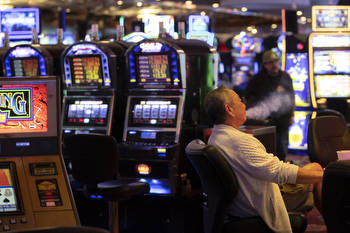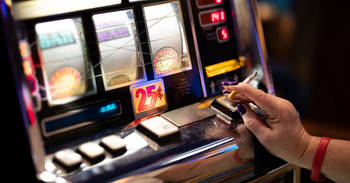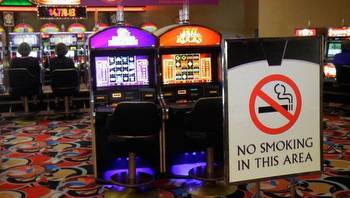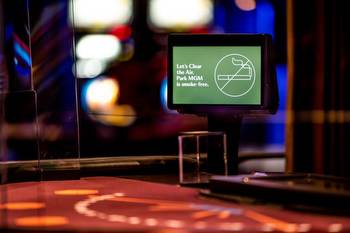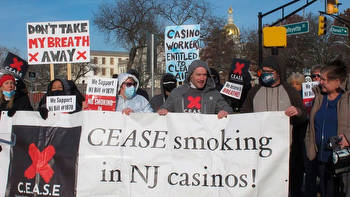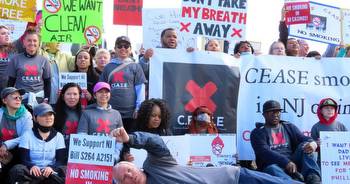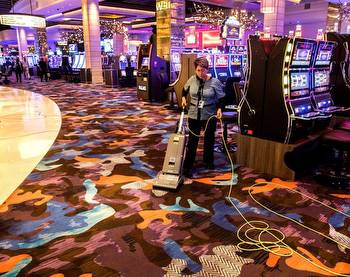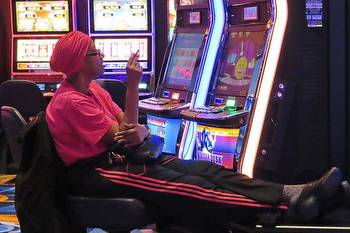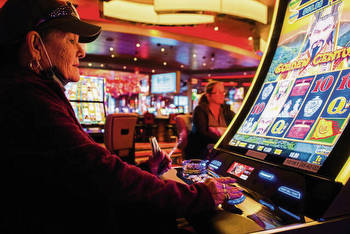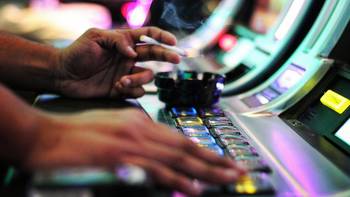Smoking ban no threat to casino revenue, report says
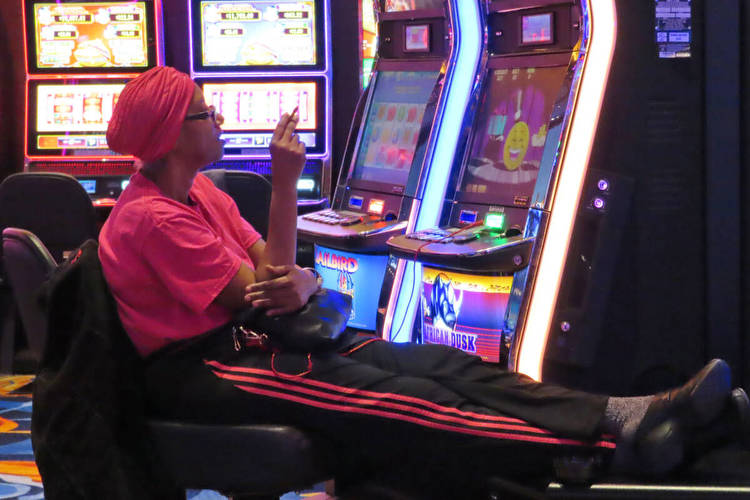
Two Southern Nevada gaming and tourism industry experts envision a time when Las Vegas casinos will ban smoking, but they say it won’t happen overnight.
And the gaming industry won’t lead the effort, even after a Las Vegas company has issued a report suggesting that ending smoking in casinos will not result in significant financial harm to the businesses.
The 30-page report issued Friday by C3 Gaming comes as several states, including New Jersey, Rhode Island and Pennsylvania, are considering banning smoking in casinos. The research firm says its report was done independently and was not financed by any outside party.
It notes that the coronavirus pandemic changed several key aspects of the casino experience, including the elimination of daily housekeeping in many places, closing of buffets and an end to room service — all of which customers have gotten used to. It suggests smoking will be the next such change to be accepted.
‘Cultural shift’
“As a nation, we have seen a cultural shift away from smoking with fewer Americans than ever smoking cigarettes,” said Amanda Belarmino, an assistant professor at UNLV’s William F. Harrah College of Hospitality.
“I think the trend of increased nonsmoking space will continue,” she said. “It can help casinos attract employees who don’t want to be exposed to secondhand smoke as well as guests. I think we may see a time when only a handful of casinos allow smoking in designated areas.”
Josh Swissman, founding partner of the Las Vegas-based Strategy Organization, said he expects some casinos may follow the lead of Park MGM, the first and only completely smoke-free casino on the Strip.
“We may see some one-offs like Park MGM, but this is not a bellwether indicative of change across the Strip,” Swissman said.
He said he is skeptical that Nevada legislators would take up the issue of casino smoking.
Park MGM opened its doors smoke-free in September 2020, nearly six months after the casinos statewide were shut down for 78 days as the COVID-19 pandemic began.
At Park MGM, smoking is not allowed in the casino, convention center, restaurants and bars, corridors or common areas, including resort pools. Smoking tobacco, pipes, vapes and e-cigarettes is only allowed in designated outside smoking areas that include the ride-share area located off the main lobby, the NoMad Hotel porte-cochere and the Central Park Terrace located on the second floor of the convention center.
The use of marijuana or any like substance is prohibited propertywide.
New legislation data
Americans for Nonsmokers’ Rights President and CEO Cynthia Hallett, who is leading the charge to ban smoking in casinos on the East Coast, issued a statement in response to the C3 study.
“Legislators now have powerful new data that should give them more than enough comfort to move forward with popular, bipartisan legislation to close casino smoking loopholes in New Jersey, Rhode Island and other states,” Hallett said. “This report directly rebuts the scare tactics casinos have employed for far too long, and at the expense of their workers’ health. We now know that norms have shifted. Smoke-free air is the expectation. That’s why more and more casinos have voluntarily gone smoke-free indoors. It’s time for casinos to end this outdated business practice that isn’t actually helping their bottom line. Legislators should act immediately.”
But not everyone agrees.
“While the pandemic has changed several aspects of the gaming environment and guest experience, I do not see a day, especially in Las Vegas, where we have a total ban on smoking,” said Brendan Bussmann, an industry analyst and founder of Las Vegas-based B Global. “In a town of what happens here, stays here, it’s hard to imagine that you ever see a complete ban.”
Business, not policy decision
Bussmann said operators have and always will continue to evaluate the customer experience. “This may include more nonsmoking areas similar to what Plaza just announced, but this should come down to a business decision, not a policy decision,” he said.
He was skeptical of the study’s findings. “The study loses some credibility when it tries to make a responsible gaming argument with a smoking ban as the leading point with zero data to back up the argument,” Bussmann said. “The same can be said on the blanket statement on policymakers and gaming revenue. It makes you question what else is assumption in the study.”
The report’s three authors — Andrew Klebanow, Lawrence Shen and Gerard Parisi — said data from multiple jurisdictions indicates that banning smoking no longer causes a dramatic drop in gaming revenue.
“In fact,” the report says, “non-smoking properties appear to be performing better than their counterparts that continue to allow smoking.”
The report looks at casinos’ performance in numerous states since the coronavirus pandemic hit in early 2020, and finds that “those casinos that implemented smoking prohibitions did not experience any drop in revenues or lost market share to nearby casinos that continued to offer smoking environments.”
Tribes also interviewed
The authors also interviewed tribal casino executives, who said profitability was starting to increase due to lower maintenance costs, adding that 157 tribes were able to end smoking in their casinos “without economic cost.”
The authors also predicted that smokers will not abandon Atlantic City casinos in droves if New Jersey bans smoking there, noting that because of smoking bans in Connecticut and New York, and a smoke-free policy at Rivers Casino in Philadelphia, gamblers from New York, New Jersey and eastern Pennsylvania would have only four options that offered smoking.
The report is the latest in a back-and-forth over whether there is evidence that smoking can be eliminated without harming casinos’ bottom line. It also takes aim at a report commissioned in February by New Jersey’s casinos predicting massive revenue and job losses if a smoking ban were implemented.
The stakes are high, particularly in New Jersey, where the main casino workers’ union is threatening a strike in July if new contracts providing big raises are not reached before then.
Gamblers in the northeastern United States interviewed by The Associated Press expressed strong support for smoke-free casinos.
“Smokers will say that they aren’t going to go gamble any more if they ban smoking,” said Linda Quinn of Montvale, New Jersey. “They said this when they made restaurants and bars nonsmoking and it didn’t affect them at all. I honestly believe it will not have an effect, and smokers say that because they don’t want the law changed.”
Erik Lovequist of Billerica, Massachusetts, quit smoking 14 years ago and has not visited Rhode Island’s Twin River Lincoln casino “in a very long time due to the entire casino, including much of the nonsmoking area, smelling like an ashtray. I’m enjoying having the entirely smoke-free Encore casino a half-hour away.”
John Bucek of Chester, New York, visits Atlantic City six times a year and quickly grew to like the absence of smoking in casinos there during the first year and a half of the pandemic.
“Now that it is back, it is terrible,” he said. “I never realized how bad it was. A lot of times it drives us out of there.”
Some gamblers who smoke, however, said they would seek out casinos that continued to allow them to do so.
Factors other than smoking
The report notes revenue declines that followed the end of smoking in Delaware, Colorado, Illinois, Deadwood, South Dakota, and New Orleans. But it also noted there were other economic factors that may have influenced revenue, including the opening of new competition nearby. And it said those revenue declines “tended to recover in subsequent years.”
The report found that gamblers in several markets did not flock to smoking casinos when others in the region prohibited smoking, citing examples from Pennsylvania, Indiana and elsewhere.
The authors conceded that, “It is an irrefutable fact that a slot machine located in a smoking area of a casino makes more money than a slot machine in a non-smoking area.”
But they also found that casinos that offer smoking do not perform better than those that don’t allow it. It showed that the Parx Casino in Philadelphia; Empire City in Yonkers, New York; Foxwoods and Mohegan Sun in Connecticut, and Resorts World in the Queens section of New York have slot machine win-per-day performance that is greater than those in Atlantic City over the past 12 months.
Las Vegas, the nation’s largest gambling market, remains a bastion of casino smoking; only one resort, Park MGM, bans smoking completely. New Jersey allows smoking on up to 25 percent of the casino floor.
The Rivers Casino in Philadelphia has been smoke-free since August, when general manager Justin Moore decided it was easier operationally to remain that way rather than changing policy to comply with frequently changing pandemic mandates from the city.
In April, the casino adopted a policy allowing its smoking customers to use a restaurant patio to smoke, avoiding the need to go through metal detectors two additional times in leaving and re-entering the casino.
The financial results have been mixed, with some good months and some where revenue fell short of projections, Moore said, adding that inflation, labor shortages and new competition nearby make it difficult to attribute revenue performance to any one factor.
The casino decided to remain smoke free even after it could have resumed smoking, in part, out of the experience of operating during the pandemic.
“It was hard to tell people, ‘We’re keeping you safe,’ and then allow people to blow particles into the air,” he said.









